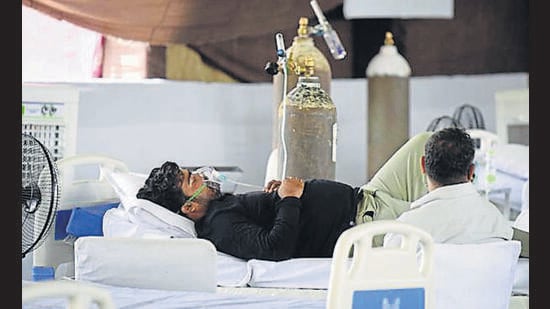Why India must come clean on Covid-19 deaths
The WHO may not have covered itself in glory over the handling of the pandemic. But the debate around India’s uncounted deaths is not about arithmetic. It’s about truth-telling. And what we owe as a nation to ourselves. And to the people
In a soft, sad tone, Jagjyot Singh talks about “fighting till the end”. His mother, Sarabjeet, admitted for Covid-19 at Delhi’s Jaipur Golden Hospital, died on the fateful night of April 23, 2021, when oxygen ran out in the intensive care unit (ICU). She was left “gasping like a fish out of water”.

She was only 58.
A year later, her family, among those of the 25 others who died the same night, is struggling, not just for justice but for mere acknowledgment. The death certificate issued in Jagjyot’s mother’s name describes the manner of death as “natural,” and the cause of death column has been left blank.
Similar deaths, from oxygen shortage for Covid-19 patients, occurred at scores of hospitals across India. These hospitals were on record, admitting the interruption in supply and desperately seeking emergency interventions as the public health system went under siege during the pandemic’s second wave.
Yet this year, as hundreds of thousands of Indians mourn and mark the first year anniversary of the loss, devastation and a lifetime of grief, Parliament was told that not a single oxygen shortage death was reported by any state.
The travesty of this, the sheer brazenness, is underscored by our response to the World Health Organization (WHO) report on uncounted Covid-19 deaths. India has rubbished the claim that of nine million uncounted fatalities globally, nearly half — 4.7 million deaths — took place here. The government has challenged WHO’s mathematical model, the use of media reports as sources, and the one-size-fits-all formula across different states, to allege bias in the assertion that nearly 10 times more deaths took place than what the official count reveals.
Sure, WHO may be discredited and has not covered itself in glory over handling the Wuhan link to the pandemic. Its modelling may well be wrong. But the Indian counter to WHO would have had power and authenticity had it been accompanied by a simultaneous visible and transparent process to try and count every citizen whose life was lost during these two years.
It is the cold and clinical insistence that our formal death count is entirely accurate — when evidence on the ground clearly shows otherwise — that, in fact, weakens our argument.
That, and a lack of empathy.
When Dr Vinod Paul, the top government official at the helm of India’s Covid-19 response, says there is “nothing dramatic” in India’s death data, he is, perhaps unwittingly, discounting the guttural tragedies and daily struggles of hundreds of thousands of Indians, most often those who are abjectly poor, to merely procure a death certificate during the pandemic.
While we get all prickly and huffy about the WHO report, I am not sure how many know that Indians who did not get an RT-PCR (reverse transcription polymerase chain reaction) test have not been counted in the official tally. This effectively means the invisibilisation of Covid-19 deaths in large parts of rural India. Whether it was the rural belt of Hosur in Tamil Nadu or the hinterland of Uttar Pradesh, every hamlet I travelled to in 2021, recorded a spike in deaths in April and May. Relatives of those who died testified to fever and difficulty in breathing — Covid-19 symptoms — but spoke of the difficulty in getting a test in their vicinity.
Hospitals were tough to reach during state lockdowns and there was also the stigma associated with being positive. Most commonly, villagers treated locally were told they probaby had pneumonia or “motijhara” (an enteric fever like typhoid), till their condition worsened and it was too late.
And, what of those who died inside ambulances and outside the closed gates of hospitals that ran short of beds? Or those who were abandoned by the river banks of the Ganga in the darkness of the night as people were either unable to afford firewood or were too terrified? Or those who had tuberculosis, cancer, or kidney disease, who could have been treated and saved, but weren’t because ambulances, doctors, and ICUs were all snowed under and unavailable?
I witnessed devastated families who sold everything — land, gold, and even their phones — to pay hospital fees. They then made dozens of trips to an administrative office to get a death certificate. Worse, there was a formal order in some states advising officials to leave it to the hospitals to certify a Covid-19 death; subsequently, the “cause of death” column was left empty for countless Covid-hit families.
So desperate was the situation that in Jaipur, a government employee who worked in the division that issued death certificates could not get one for his wife who died from Covid-19, prompting him to write a letter urging a more transparent and humane system.
The debate around India’s uncounted deaths is not about arithmetic. It’s about truth-telling.
And what we owe as a nation to ourselves. And to our people.
Barkha Dutt is an award-winning journalist and author The views expressed are personal.
Continue reading with HT Premium Subscription





